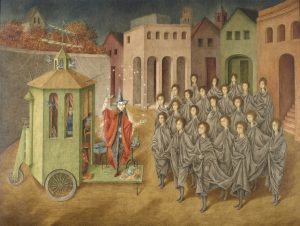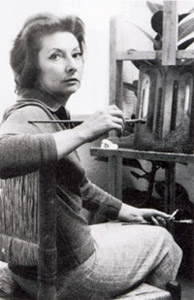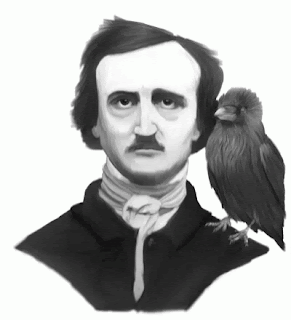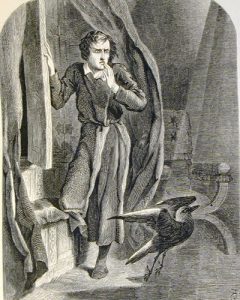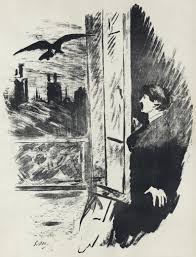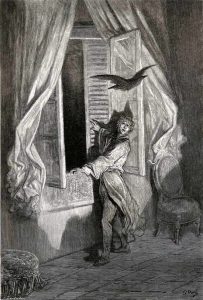The narrative of "The Raven" is told by an unnamed young man, who mourns for his lost lover, called Lenore. It is purposely set on a December tempestuous night, during which, the narrator is surprised by the unexpected visit of a black raven. The poem's dreamlike, otherworldly atmosphere makes the reader wonder whether the narrator has actually had an encounter with a mysterious bird repeating the word "nevermore" or the entire incident has been a product of his tormented imagination. Here is the poem's most famous beginning:
Once upon a midnight dreary, while I pondered, weak and weary,
Over many a quaint and curious volume of forgotten lore—
While I nodded, nearly napping, suddenly there came a tapping,
As of some one gently rapping, rapping at my chamber door.
“’Tis some visitor,” I muttered, “tapping at my chamber door—
Only this and nothing more.”
Ah, distinctly I remember it was in the bleak December;
And each separate dying ember wrought its ghost upon the floor.
Eagerly I wished the morrow;—vainly I had sought to borrow
From my books surcease of sorrow—sorrow for the lost Lenore—
For the rare and radiant maiden whom the angels name Lenore—
Nameless here for evermore.
You can read the entire poem
here.
"The Raven" has been a source of inspiration ever since its publication. Well-known illustrators have produced artwork for its publications. Here are some examples:
John Tenniel (the illustrator of Alice in Wonderland), 1858
Édouard Manet (lithographs, for the publication of Stéphane Mallarmé's translation of "The Raven" into French), 1875
Gustave Doré (woodcuts), 1884
Edgar Allan Poe is regarded as one of the central figures of American Romanticim. Apart form poetry, he has also written famous tales of mystery and the macabre and he is considered to be the inventor of detective fiction, as well as a valuable contributor to the genre of science fiction.
And if you like scary stories, you will really enjoy watching Tim Burton's and Rick Heinrichs'
Vincent, a short film dedicated to Edgar Allan Poe and Vincent Price, an American actor famous for his roles in horror films. (In fact, in 1963, Vincent Price starred in The Raven, an adaptation of Poe's poem by Roger Corman.)
Did You know? In the third episode (called "Treehouse of Horror") of Season 2 of
The Simpsons, aired in 1990, we see an
adaptation of "The Raven". James Earl Jones narrates the poem!
